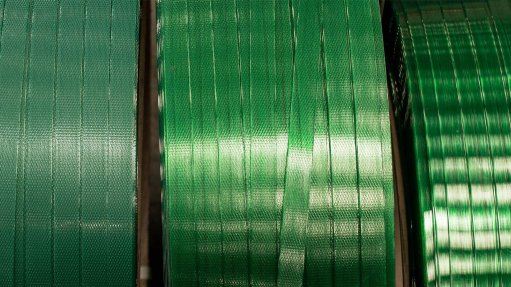
THAT’S A STRAP! Green strapping is increasing the amount of polyethylene terephthalate that can be recycled
Joining the shift towards sustainable packaging and product design, wood-based products manufacturer PG Bison has decided to use only locally sourced and recycled polyethylene terephthalate (rPET) strapping.
Not only does this move form part of the company’s drive to be more green but it also saves the company about 7% on the strapping it would normally have imported from a supplier in Italy.
The Pro-10 strap being supplied to PG Bison is manufactured by polyester fibre manufacturer Propet, in Cape Town.
Compatibility trials for the strapping started in the third quarter of last year at the PG Bison operation, in Mkhondo, Mpumalanga. “Propet has had to make some changes to the formula to ensure appropriate process compatibility, so it has been a bit of a trial-and-error journey,” says PG Bison project manager Etienne le Roux.
PG Bison CEO Gerhard Victor adds that the recycled strapping now conforms to stringent technical specifications, such as high tensile strength and, most importantly, maintains the product stack integrity during handling and transportation.
Victor points out that PG Bison uses 9.1-million metres of plastic strapping yearly to bind its wooden surfacing and decorative panel products, with the recycled rPET material set to divert the equivalent of five-million post-consumer plastic bottles, or 115 t/y of PET, from landfills.
“At PG Bison, we use strapping on almost every product that we manufacture. Because our wood is locally, responsibly and sustainably sourced, it was important for us to extend this approach to the packaging of our products too,” explains Victor.
He adds that, although the strapping is single-use for safety reasons, it can be recycled after collection.
Plastics recycling company Petco CEO Cheri Scholtz says the move is a boon for keeping plastic waste out of the environment, and that it is encouraging that industry is starting to see the bigger vision – and the economic value inherent in the use of rPET.
“Nationally, the recycling rate for PET plastic is, significantly, more than 60% a year and comprises mainly clear and blue plastic bottles, which are more feasible to transform into a range of recycled materials, including polyester fibre.
“What is exciting about rPET strapping is that it can be made from green plastic bottles, which have had a limited end-use market to date. “As other manufacturers make the switch to locally sourced rPET strapping, like PG Bison has done, we’ll be able to use coloured plastic better and grow our overall recycling rates even further,” says Scholtz.
“With this new project, every roll of Pro-10 strap consumed in South Africa means that about 1 000 coloured bottles can now be collected and recycled in SA,” says PETCO strategic business planner Oscar Baruffa.
PG Bison has ordered the Pro-10 strapping in the signature green of the company, which, Baruffa adds, will increase Petco’s recycling capacity by 2.5%. Although coloured rPET does get recycled into polyester fibre products, there is limited demand for coloured material.
Propet director Chandru Wadhwani says a responsible approach by more players in the manufacturing sector would assist the plastics industry in fulfilling its extended producer responsibility and drive PET recycling rates in South Africa.
“As we have often witnessed, without willing users of products made from rPET, we would be leaving behind far more PET bottles destined for the landfills and oceans.”
He adds that the new production line for Pro-10 strap featured the same European technology – developed by plastic strapping tape suppliers SIMA, in Italy – used by strapping manufacturers globally.
“As such, quality requirements from clients like PG Bison will be met comfortably and, in some instances, surpassed. With Propet’s ISO accreditation, the supply of Pro-10 strapping also comes with improved traceability and assurance of quality.”
PG Bison’s decision to use a local rPET strap aids Propet in meeting its extended producer responsibility objectives through the recycled PET value chain without any compromise on quality, concludes Wadhwani.